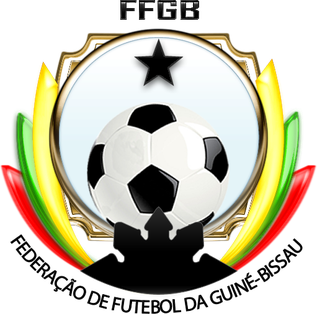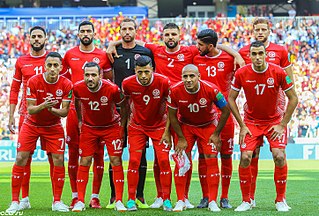Related Research Articles

The Tunisia national football team represents Tunisia in men's international association football. The team is a member of both FIFA and CAF, the Confederation of African Football. It is governed by the Tunisian Football Federation, founded in 1957. Colloquially known as the Eagles of Carthage, the team's colours are red and white, and the bald eagle is its symbol. Most of Tunisia's home matches are played at the Hammadi Agrebi Stadium in Radès since 2001.

The Ivory Coast national football team represents Ivory Coast in men's international football. Nicknamed the Elephants, the team is managed by the Ivorian Football Federation (FIF). The team has won the Africa Cup of Nations three times, in 1992, 2015 and 2023, and has qualified for the FIFA World Cup three times, in 2006, 2010, and 2014.

The Liberia national football team, nicknamed the Lone Stars, represents Liberia in men's international football and is controlled by the Liberia Football Association. Although the nation produced the 1995 FIFA World Player of the Year, George Weah, its football team has never qualified for the FIFA World Cup and has qualified for the Africa Cup of Nations just twice—in 1996 and 2002. It is a member of both FIFA and the Confederation of African Football (CAF).

The Cape Verde national football team represents Cape Verde in men's international football, and is controlled by the Cape Verdean Football Federation. The team has never qualified for the FIFA World Cup, but has qualified for four Africa Cup of Nations tournaments, in 2013, 2015, 2021 and 2023. They have reached the quarter finals in 2013 and 2023.

The Mauritania national football team, nicknamed Al-Murabitun in the reference to Almoravid dynasty, represents Mauritania in men's international football. It is controlled by the Féderation de Football de la République Islamique de Mauritanie, and is a member of the Confederation of African Football. They have not qualified for the FIFA World Cup. However, in the Amílcar Cabral Cup, a regional tournament for West Africa, Mauritania came fourth in 1980 on hosting the competition. The national football team of Mauritania later runners-up in 1995, losing on penalties to Sierra Leone after the final finished 0–0.

The Niger national football team represents Niger in international football through the Nigerien Football Federation, a member of Confederation of African Football (CAF). Niger plays in the colors of the flag of Niger, white, green and orange. Their nickname comes from the Dama gazelle, native to Niger, the Hausa name of which is Meyna or Ménas The Dama appears on their badge in the colors of the national flag.

The Guinea-Bissau national football team represents Guinea-Bissau in men's international association football and it is controlled by the Football Federation of Guinea-Bissau, The team has never qualified for the FIFA World Cups but qualified for the Africa Cup of Nations four times, making their debut in 2017. The team is a member of both FIFA and Confederation of African Football (CAF).

The Equatorial Guinea national football team represents Equatorial Guinea in men's international football and is controlled by the Equatoguinean Football Federation, a member of the Confederation of African Football (CAF).

The São Tomé and Príncipe national football team is the national association football team of São Tomé and Príncipe and is controlled by the São Toméan Football Federation. It is a member of the Confederation of African Football (CAF) and FIFA.
Christian Caulker is a Sierra Leonean footballer who plays for Maryland Bobcats FC as a goalkeeper.

The Equatorial Guinea women's national football team, nicknamed the Nzalang Femenino, has represented Equatorial Guinea in senior international women's football competition since 2000. It is controlled by the Equatoguinean Football Federation, the governing body for football in Equatorial Guinea.
Daniel Vladmir Ekedo Chigozirim is a Nigerian-born naturalized Equatoguinean football midfielder, who is currently a free agent.
Juan Pablo Mbela Roku is an Equatoguinean former professional football who played as a striker.
Francis Duclair Mbome Mbome is a former footballer who played as a midfielder. Born in Cameroon, he has represented Equatorial Guinea internationally.
The Sierra Leone women's national football team is governed by the Sierra Leone Football Association.
The 2014 African U-20 Women's World Cup Qualifying Tournament was the 7th edition of the African U-20 Women's World Cup Qualifying Tournament, the biennial international youth football competition organised by the Confederation of African Football (CAF) to determine which women's under-20 national teams from Africa qualify for the FIFA U-20 Women's World Cup.

This is a list of the Tunisia national football team results from 2000 to 2019.
This article provides details of international football games played by the Senegal national football team from 2010 to 2019.
The Tunisia national football team has played teams from every confederation. Their first international match was played on 2 June 1957 in Tunis against Libya, winning 4–2. The team they have played the most is Morocco, with a total of 50 matches played.

The Tunisia national football team is the national team that represents Tunisia in men's international football, since it played its first match on 2 June 1957 against Libya, which ended with Tunisia winning 4–2. It is a member team of the FIFA internationally and the Confederation of African Football (CAF) on the continent. It is supervised by the Tunisian Football Federation, which was established on 29 March 1957, after Tunisia's independence. Jalel Kadri has been coaching the team since 30 January 2022, accompanied by his assistants Ali Boumnijel and Selim Benachour. The Tunisian national team is nicknamed the Eagles of Carthage, The team's colors are red and white, similar to the colors of the Tunisian flag, and its symbol is the Bald eagle. There have been periods of regular Tunisian representation at the highest international level: from 1962 to 1978, from 1994 to 2008 and again from 2014 onwards. Most of its matches have been played since 2001 at the Stade Hammadi Agrebi which is located in the city of Radès, in the southern suburbs of the capital, Tunis. It has a capacity of 60,000 spectators.
References
- ↑ "Amoabeng Oscar". Archived from the original on 8 August 2010. Retrieved 22 June 2009.
- ↑ "Ghanaian defender dropped from Eq.Guinea final AFCON squad".
- ↑ Profile in GhanaWeb.com
- ↑ Oscar Amoabeng – FIFA competition record (archived)
- ↑ Equatorial Guinea - South Africa: FIFA.com
- ↑ Sierra Leone - Equatorial Guinea
